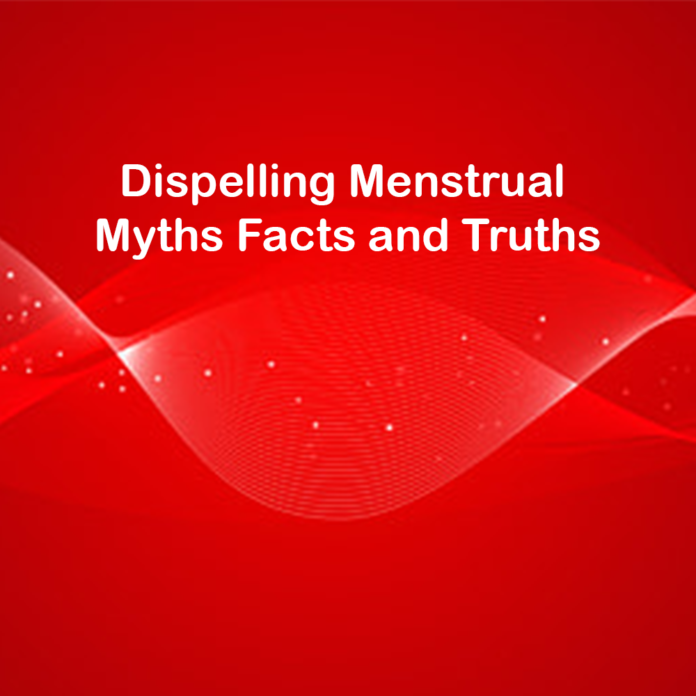
Common Misconceptions About Menstruation
Menstruation, despite being a natural biological process, remains surrounded by myths and misconceptions. This article aims to clarify common menstrual myths, ensuring that readers gain accurate information about menstrual health.
Myth 1: Period Blood is Dirty
One widespread myth is that period blood is unclean. In reality, menstrual blood is a mixture of blood, tissue, and mucus from the uterine lining. It’s no different from other bodily discharges, and maintaining proper hygiene ensures cleanliness and health during menstruation.
Myth 2: Using a Tampon or Menstrual Cup Breaks the Hymen
Many believe that using tampons or menstrual cups can break the hymen, leading to misconceptions about virginity. However, the hymen can stretch or tear due to various activities like sports or other physical actions, not just the use of menstrual products.
Myth 3: You Can’t Get Pregnant While on Your Period
Though pregnancy during menstruation is less likely, it is possible. Sperm can survive in the reproductive system for up to five days, so if ovulation occurs shortly after menstruation, there is a risk of pregnancy.
Myth 4: All Women Have a 28-Day Menstrual Cycle
Not every woman has a 28-day menstrual cycle. In fact, cycles can range between 21 to 35 days. Stress, hormonal imbalances, and health conditions can influence the duration and regularity of a menstrual cycle.
Myth 5: Menstrual Hygiene Practices Are Unimportant
Good menstrual hygiene is crucial for preventing infections and maintaining overall health. It’s important to regularly change menstrual products, use clean and safe materials, and practice proper washing techniques to avoid bacterial growth.
Understanding the Menstrual Cycle
To fully understand menstrual myths, it’s essential to know the basics of the menstrual cycle, including its phases and hormonal fluctuations.
Phases of the Menstrual Cycle:
- Menstruation: Shedding of the uterine lining.
- Follicular Phase: Follicles in the ovaries mature.
- Ovulation: Release of a mature egg.
- Luteal Phase: The body prepares for a potential pregnancy.
The Role of Hormones
Estrogen and progesterone are the key hormones that regulate the menstrual cycle. Estrogen supports the growth of the uterine lining, while progesterone prepares the body for a possible pregnancy.
Debunking Myths About Fertility and Pregnancy
Despite common belief, it’s possible to get pregnant during menstruation. While the likelihood is lower, women with shorter or irregular cycles may ovulate sooner than expected, increasing the chances of pregnancy.
Addressing Cultural and Societal Misconceptions
Menstruation has been misrepresented in various cultures and societies. Understanding these perspectives can help break taboos and foster a more inclusive approach to menstrual health.
Menstrual Stigma
In some cultures, menstruation is considered taboo, leading to silence and shame surrounding the topic. Educating communities and promoting open discussions can help reduce stigma and provide women with the resources they need to manage their health.
Menstruation in Mythology and Religion
Throughout history, menstruation has been represented in myths and religious teachings. Some of these narratives have contributed to misconceptions, but understanding them helps us challenge outdated beliefs.
Managing Menstrual Health
Promoting menstrual wellness involves more than just dispelling myths. It also requires practical approaches to managing discomfort and maintaining hygiene.
Tips for Managing Menstrual Cramps
Relieving menstrual discomfort can be achieved through methods like over-the-counter pain relief, heat therapy, gentle exercise, and relaxation techniques like yoga or meditation.
Maintaining Proper Menstrual Hygiene
Good hygiene practices, such as changing menstrual products regularly and using clean materials, are essential to avoid infections. Additionally, proper disposal of sanitary products helps maintain a clean environment.
Promoting Menstrual Education and Empowerment
Empowering women with accurate menstrual health knowledge is crucial to debunking myths and promoting equality.
Breaking the Silence
Open discussions about menstruation are key to dispelling myths and eliminating shame. Menstrual health education in schools and communities can provide young girls with the knowledge and confidence to manage their menstrual health.
Menstrual Equity
Ensuring access to menstrual products and healthcare services for all women is a fundamental aspect of menstrual equity. Providing affordable and eco-friendly menstrual products helps promote sustainable menstrual health practices.
Conclusion: Overcoming Taboos and Misconceptions
By educating women and communities, we can challenge menstrual myths, promote proper menstrual hygiene, and reduce stigma. Accurate information about menstruation is essential for empowering women to take charge of their health and well-being.














